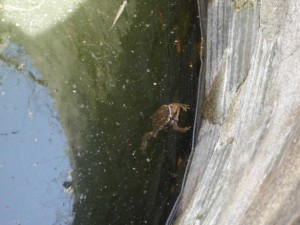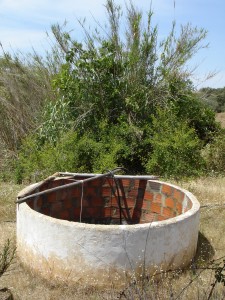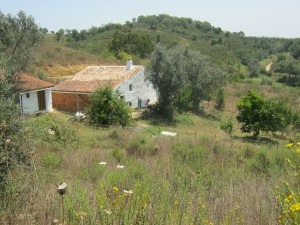We are tapping into next doors’ well at the valley’s low point – Paul has been cleaning and covering it and keeping the brambles at bay for over a decade in absence of a resident to do so. Wells need love too. Next door to that – another two ruins – are another two wells. The importance of a consistent natural proximate water source cannot be underestimated – drinking, cooking, washing, growing fruit and vegetables – all depend on an abundance of water.
However well-full or not the aim is conscious rather than carefree water usage; the tap is not left on while tooth-brushing, plugs save a sink-full for the next hand wash, bathwater is saved when possible; wherever possible water is used minimally and reused maximally, such as would befit anyone with an awareness of its importance to all animal life, especially so in a hot dry climate like southern Portugal, especially so when living remotely from mains water. To be clear – dry or wet climate, mains or off-grid – we live by these habits because they are in keeping with what nature is producing outside our door – low-impact, conscious, sustainable, healthier.
Piping has been trenched in below the ground from well to water tank (50 metres), passing the house and up the hill for added head (tap water pressure). A submersible pump remains in the well and is brought to life by a petrol generator for 15 minutes a few times a week, to keep the tank topped up (3,000 litres). A house of four people washing and drinking sensibly as above will go through such a tank – over a cubic metre in size – in a week.
Again – once an individual is involved in the process of sourcing water, once they can see where it comes from (well), how it got there (underground water running down the hill to the lowest point), how it gets up to the tank (pump, pipes, power) and out of the taps (more pipes and plumbing) – such an individual, especially if shown such a process when young, will be more capable of integrating into – rather than imposing itself upon – the ecological systems outside their door.
The wood burning stove has a water heater so in winter when the fire is on frequently there is frequently hot water. For summertime or other times a black coiled water pipe in the garden is passively heated by the ever-present sun. An outside shower by this means is this springs’ project; one project of many.
Paul’s house is solar powered. This involves some panels, some batteries, some cables, an inverter, and a fair bit of applied knowledge. Lights are not left on. Due to the sunny climate there is power enough to illuminate rooms, charge laptops, phones, hand drills and the like, and power a broadband connection. Any electrical goods with around 300W or less in output is fine for occasional house usage – for anything larger like the well-pump or power tools the petrol generator is used. Candles of an evening are needed in rare case of emergency when power is low after a handful of sun-less days. Candles of an evening are also used because they are a charming and antiquated light, and cheap – a worst case total reliance on them each night would amount to around 8E a month.
To augment the system and depend less on the sunlight a small wind turbine shall soon be installed. It is worth reiterating, as with water usage, that this is a small power system designed for small usage, as outlined above. It simply will not provide the power to run an enormous television or vacuum cleaner, to boil a kettle or run a toaster or power a microwave. We watch films on a laptop. We brush the floor regularly. We use a gas cooker that boils a kettle and toasts your bread and heats your food – such differences are differences of habit adjustment and of quantity rather than of quality – centralised modern living affords an excess WE side-step by choice, by principle, with pleasure.




